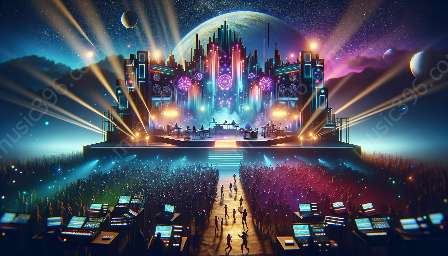Electronic music in video games has a fascinating and diverse history, spanning from the early days of 8-bit soundtracks to the complex, immersive compositions of modern gaming masterpieces. This article delves into the evolution of electronic music in video games and its significant impact on gaming culture.
The Early Days: 8-Bit Soundtracks
In the 1970s and 1980s, the limited storage capacity and technical constraints of early gaming systems, such as the Atari 2600 and the Nintendo Entertainment System (NES), gave rise to the iconic 8-bit soundtracks that laid the foundation for electronic music in video games. Composers had to work within strict limitations, using the distinctive sound chips of these systems to create memorable and innovative musical pieces that complemented the gaming experience.
One of the most legendary examples of 8-bit music is the soundtrack of the NES game 'Super Mario Bros.' The catchy, upbeat themes composed by Koji Kondo became instantly recognizable and left an indelible mark on video game music history.
The Technological Revolution: Advancements in Sound Design
As gaming systems evolved, so did the capabilities of sound design and music composition. The arrival of 16-bit consoles, such as the Sega Genesis and the Super Nintendo Entertainment System (SNES), allowed composers to explore more complex musical arrangements and experiment with a wider range of sounds.
Composers like Yuzo Koshiro, known for his work on the 'Streets of Rage' series for the Sega Genesis, pushed the boundaries of electronic music in video games by incorporating elements of dance, techno, and ambient music into their compositions. These developments laid the groundwork for the convergence of electronic music and gaming, setting the stage for the future evolution of video game soundtracks.
The Rise of Immersive Soundscapes
With the advent of CD-based gaming platforms, such as the Sony PlayStation and the Sega Saturn, game developers and composers gained access to significantly expanded memory and audio capabilities. This new frontier ushered in a golden age for electronic music in video games, as composers embraced the opportunity to create fully immersive and cinematic soundscapes that enhanced the storytelling and gameplay experience.
One of the most influential titles from this era is 'Final Fantasy VII,' which featured a sweeping, orchestral score composed by Nobuo Uematsu. The game's soundtrack showcased the emotional depth and complexity that electronic music could bring to the gaming world, solidifying its status as a transformative force in video game storytelling.
Modern Masterpieces: Blending Genres and Pushing Boundaries
Today, electronic music in video games continues to evolve and thrive, fueled by advancements in technology and the growing influence of electronic music genres, such as EDM, trance, and synthwave. Composers and artists collaborate to create dynamic and diverse soundtracks that span a wide spectrum of musical styles, from high-energy, pulse-pounding tracks to ethereal, atmospheric compositions.
Games like 'Hotline Miami,' known for its retro-futuristic synthwave soundtrack, and 'Undertale,' praised for its eclectic and emotionally resonant music, showcase the versatility and innovation of electronic music in modern gaming. These titles have redefined the role of music in video games, emphasizing the integral connection between audio and gameplay immersion.
The Impact on Gaming Culture
Electronic music has become an integral part of gaming culture, shaping the way players perceive and interact with virtual worlds. From setting the mood for intense boss battles to evoking a sense of nostalgia with iconic themes, video game soundtracks have the power to forge deep emotional connections with players.
Furthermore, the influence of electronic music in gaming extends beyond individual titles, permeating the broader landscape of pop culture and music appreciation. Electronic artists and composers have gained recognition and acclaim for their contributions to video game soundtracks, highlighting the significance of gaming music as a legitimate and impactful art form.
Conclusion
The history of electronic music in video games is a testament to the creative ingenuity and technical prowess of composers and artists who have continually pushed the boundaries of sound design and music composition. From the humble beginnings of 8-bit soundtracks to the expansive, genre-blurring soundscapes of today, electronic music has left an indelible mark on gaming culture and continues to inspire new generations of players and music enthusiasts alike.


